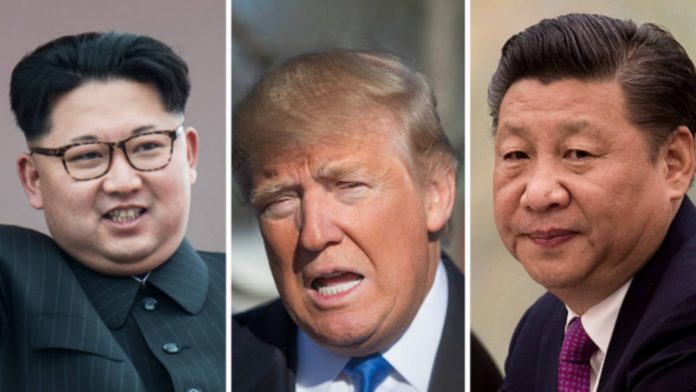All of the recent discussions surrounding North Korea brings about the question of whether it’s propaganda or a crisis unfolding before our eyes. The latest ‘attacks’ by North Korea could prompt action from the United States and other countries in the region. This movement could lead the world into the next phase toward World War Three.
Even though North Korea is only a small country, a lot is on the table when it comes to its actions. North Korea is often considered China’s bulldog, and it would substantially appear as though North Korea is testing the resolve of the new Trump administration. This week, North Korea fired yet another missile aimed at Japan, that landed in the sea. It is being reported that that missile was fired to protest the meeting between China and the USA.
However, there is yet another crisis unfolding; North Korea appears to be hacking the banking systems around the world, according to Kaspersky software experts. The hacker collective in North Korea is code named “Lazarus,” and is being linked to several intrusions around the world. Supposedly this is the same group connected to attacks against South Korea’s banks and broadcasters in 2013 and the Sony hack in 2014:
Banks and security researchers have previously identified four similar cyber-heists attempted on financial institutions in Bangladesh, Ecuador, the Philippines, and Vietnam.
But researchers at Kaspersky now say the same hacking operation — known as “Lazarus” — also attacked financial institutions in Costa Rica, Ethiopia, Gabon, India, Indonesia, Iraq, Kenya, Malaysia, Nigeria, Poland, Taiwan, Thailand, and Uruguay.To hide their location, hackers typically launch cyber attacks from computer servers far from home. According to Kaspersky, the Lazarus hackers carefully routed their signal through France, South Korea, and Taiwan to set up that attack server. But there was apparently one mistake spotted by Kaspersky: A connection that briefly came from North Korea.
But wait, just months ago it was the same story about Russian hackers? Except in that case mainstream media exclaimed that the Russians had hacked the USA, their evidence was almost identical to what the Russian Kaspersky mouthpiece is reporting; somehow, someway the hackers left a trace right to their front door with their IP address.
[fvplayer src=”https://player.vimeo.com/external/212075474.sd.mp4?s=7fafac19630838a40a1c70057e5da72ae44e288b&profile_id=164″ splash=”https://christianjournal.net/wp-content/uploads/2017/04/north-korea-wikimedia.png”]
Throwing a wrinkle in the mix, as Wikileaks exposed, hackers can mask attacks and blame other countries. Wikileaks leaked the CIA’s scapegoat software called “Marble Framework” which allows the CIA or any intelligence organization with access to similar software to blame other countries easily. Meaning, that there is no way to tell where the attack is coming from.
CIA's "Marble Framework" shows its hackers use potential decoy languages https://t.co/Hm3pTPSXIS
Background: https://t.co/GsoN4BuyTz pic.twitter.com/ZT66doCnfY
— WikiLeaks (@wikileaks) March 31, 2017
Lessons Learned
Throughout the course of history, several false flag operations have taken place, all of which have had the objective of accomplishing a particular goal by the organizer. Most of the time, they are successful with such, however several times they are caught and exposed by individual reporters or independent media. There is one agenda potentially at play that has been exposed time and time again, that will bring down the world economy, and it will be done by a hack. In addition to that potential outcome there is also the narrative that the banks need biometric security, or in other words, they need to implement some form of a chip to “keep us safe” from the hack attacks.
Both scenarios have long been theorized, and exposed – the question always was, when? Are we witnessing the North Korean regime play the scapegoat, or is Kim Jung Un hacking the banking systems of the world?
In light of the above scenario, another is appearing, war with the North Koreans.
Trump stated in response to both the latest Syrian chemical weapon attack and the North Korean missile test on April 5th, 2017: “I now have responsibility, and I will have that responsibility and carry it very proudly,” Trump said during a news conference with Abdullah, with whom he huddled earlier in the Oval Office.
When questioned if the administration would take new action, Trump said. “You will see.” A response from the United States to the North Koreans would possibly take place after Trump’s meeting with his Chinese counterpart Xi Jinping where they will discuss both trade and the crisis unfolding.
Adding even more mystery to the scenario are the words by the Secretary of State Rex Tillerson;
North Korea launched yet another intermediate range ballistic missile. The United States has spoken enough about North Korea. We have no further comment.
The statement made by the US administration could potentially indicate the prodding by the North Koreans is not working, or it could mean that the US is preparing a response, either way, the statement by Tillerson sheds a light on exactly where the US administration is in regards to North Korea; the US is done talking.


![[VIDEO] Drag Queen Drag Shows Are Now Infesting Churches](https://christianjournal.net/wp-content/uploads/2019/11/Screenshot-2019-11-22-at-9.02.01-PM-218x150.png)
![[VIDEO] Starbucks Worker Dumps Milkshake On Open Air Preachers Head](https://christianjournal.net/wp-content/uploads/2019/11/Screenshot-2019-11-22-at-7.23.43-PM-218x150.png)
![[VIDEO] Man Arrested For Threatening To Kill Female Abolitionist With Crowbar](https://christianjournal.net/wp-content/uploads/2019/11/MLock-1-218x150.jpg)
![[VIDEO] Drag Queen Drag Shows Are Now Infesting Churches](https://christianjournal.net/wp-content/uploads/2019/11/Screenshot-2019-11-22-at-9.02.01-PM-100x70.png)
![[VIDEO] Starbucks Worker Dumps Milkshake On Open Air Preachers Head](https://christianjournal.net/wp-content/uploads/2019/11/Screenshot-2019-11-22-at-7.23.43-PM-100x70.png)
![[VIDEO] Man Arrested For Threatening To Kill Female Abolitionist With Crowbar](https://christianjournal.net/wp-content/uploads/2019/11/MLock-1-100x70.jpg)


